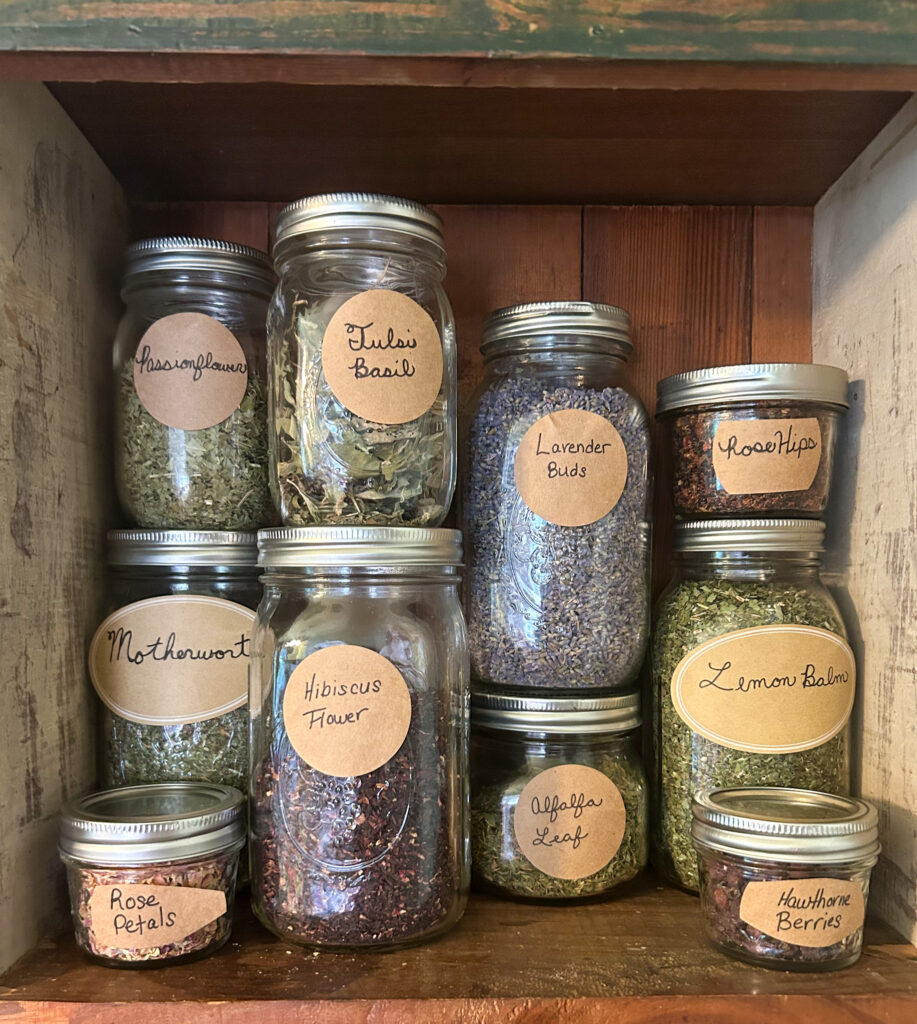This post contain affiliate links. See my disclosure here.

Leonurus Cardiaca
The latin name for motherwort herb is leonurus cardiaca. Motherwort is also called the lion hearted herb and the word leonurus translates to lions tail while cardiaca means relating to the heart. Motherwort is found growing in many places including meadows, fields, backyards, roadsides, overgrown gardens, along riverbanks and many other places. It is a perennial herb in zones 4-8 with pale pink, purple pink or white flowers. Its square stem is a very obvious indication that it is a member of the mint family. It does well growing in moist gravelly soil. Motherwort has a rich history of traditional use in treating fevers, high blood pressure, anxiety and women’s reproductive health.
Motherwort’s benefits
Some of the common motherwort uses pertain to heart health, the uterus and reproductive system and the nervous system.
Heart Palpitations
Motherwort herb is traditionally used to help calm the heart. Heart palpitations caused by stress and anxiety can be reduced with the use of motherwort herb. According to herbalist Susun Weed, taking motherwort herb daily can help new blood vessels grow to the heart. It can also help lower blood pressure and is a heart tonic meaning it can strengthen the physical heart.
The Uterus
Motherwort herb is known to treat women’s reproductive system. It is a uterine stimulant and an emmenagogue that helps in the flow of menstrual blood. An emmenagogue is an herb that promotes a healthy menstrual flow and eases menstrual cramps from painful periods. Motherwort herb is also a uterine tonic meaning it increases the firmness and strength of the uterus. It also benefits the hormonal health of women of reproductive age by treating what is known as a cold uterus. A cold uterus happens when the uterine lining doesn’t respond to the warming hormone progesterone. This results in brown blood during a menstrual cycle. Motherwort herb has also been useful in bringing on a delayed menstrual cycle.
The Nervous System
Motherwort herb calms the nervous system by helping the transition from a sympathetic state to parasympathetic state. In other words it helps to move the body out of “fight, flight or freeze” state to the “rest and digest” state. When we are constantly in a sympathetic state, we are closed down at our heart center. It becomes very difficult for the emotional heart to fully receive life. For me, softening in my heart space has become synonymous with balancing my nervous system. I myself tend to fall into a freeze state.
Postpartum Mothers
Motherwort is definitely a mother’s herb. In fact it is a time honored postpartum herb. It can help lift the spirits and may help ease cramping afterbirth. Although it is not recommended while pregnant.
Drinking Motherwort Tea

Motherwort herb as tea is very earthy and bitter. The tea is made with the aerial parts of the plant rather than the roots. Some find it too bitter to drink alone and prefer to combine it with other herbs. I like it alone but sweetened with honey. For an infusion I will steep 1 to 2 teaspoons for about 10 minutes. Steeping herbs in hot water to make tea is a really simple way to enjoy their benefits and healing power.
Motherwort Tincture
A tincture is an extract of plant material typically into alcohol but can be made with glycerin and water. The medicinal constituents are extracted by the liquid creating a potent medicine. Tinctures work fast because they are easily absorbed into the bloodstream. Motherwort tincture is made with the aerial parts of the plant and provides the same support as tea but not as gentle tea. If you purchase motherwort tincture then the bottle should come with directions for dosage. This is the motherwort tincture I recommend. If you prefer to make your own then the typical dosage for an adult is 1 to 3 dropperfuls, 1 to 3 times per day. You can take the motherwort tincture by itself or dilute it in a beverage like water, coffee, tea or a smoothie.
Folk Method for Making a Tincture

This is the only method I have ever used for making tinctures. However there are more precise, scientific methods you can research. For this method you will need:
Dried Herbs
80 Proof Vodka
Quart Mason Jar with lid
Cheesecloth
Directions:
1. Fill one-fifth of the quart mason jar with dried herbs.
2. Add vodka to cover 1 to 2 inches above the herbs.
3. Secure lid and shake.
4. Check over the next few days and add more vodka if neccesary to maintain the 1 to 2 inches above the herbs.
5. Store in a cool, dark place for 2 to 4 weeks. Shake daily.
6. Then strain the mixture through cheesecloth and squeeze out any excess liquid.
7. Store your tincture in a tightly sealed tincture bottle and label and place inside your apothecary cabinet.
Taste Profile of Motherwort
Motherwort does have a bitter taste to it. It is earthy and energetically is considered a cooling and drying herb. Knowing the herbal energetics of an herb helps to understand how it works on the body.
Creating Herbal Tea Blends with Motherwort Herb
It is rare that I drink an herb all on its own. I typically combine several herbs together. Making herbal tea blends does not need to be complicated. Just try combining 2 or 3 different herbs and see what you like and what works. Some of my go to herbs that pair nicely with motherwort are:
Lemon Balm
Also called Sweet Melissa. This herb is calming and helpful in winding down the body and mind.
Milky Oats
Also called Oatstraw. It is calming and relaxing the mind and body
Lavender
This is another calming but uplifting herb for the spirit.
Chamomile
Commonly used to help soothe stomach aches and easing into a restful sleep.
Peppermint
Peppermint may help ease stomach complaints and helps increase the effect of other herbs.
Passionflower
I find passionflower to be incredibly effective at helping calm the repetitive thoughts that prevent sleep.
Rose Petals
Roses are just my favorite to add to tea blends. I love their sweet fragrance, taste and beauty.
Cinnamon chips
I add cinnamon to lots of my tea blends because it is warming to the body.
Hibiscus
Yet another herb with a feminine feel like rose petals. Hibiscus is hydrating and refreshing.
Nettles
Stinging Nettles is valued for being loaded in nutrients and minerals.
Motherwort Tea Recipe

As I said earlier motherwort herb does have a bitter taste so combining it with other herbs to make an herbal blend can help to cut that bitterness. This recipe is helpful to inspire an open heart and a calm demeanor.
Open Heart Tea
2 parts motherwort herb
2 parts lemon balm
1 part rose petals
1 part hawthorn berries
1/2 part nettles
1/2 part lavender
Where to Find Motherwort Tea and Other Herbs
Motherwort herb can be started from seed and grown in your herb garden. Although it can also be foraged if you are sure of what you are looking for. I cannot at this point in time grow or forage all of the herbs I have in my apothecary even though I hope to some day. Therefore, I use Mountain Rose Herbs when I need to restock my apothecary cabinet. However, if you would rather try motherwort tea in a premade blend then I suggest this Wise Woman Tea from Mountain Rose Herbs.
Gathering herb supplies as a feminine grounding practice
There is something grounding and beautiful about collecting herbs in jars, storing them in a cupboard and taking them out to brew a cup of hot tea. The aroma of the different herbs and the feel of them between your fingertips as you take a pinch of this and a pinch of that is a very sensual practice that is ancestral and mysterious.

Herbal Learning
I love herb books for learning all about herbalism. One of my favorite books is The Herbal Apothecary by JJ Pursell. This was the first herb book I ever read and I still use regularly to this day. Another favorite herbalist of mine is Rosemary Gladstar and her book Medicinal Herbs: A Beginners Guide is another great book to grow your knowledge of herbs.

Leave a Reply